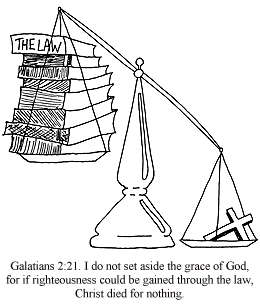Introduction: The population of Antioch in Syria was largely Greek. The city became the headquarters for the Gentile church and was Paul's base of operations. Peter came for a visit, and Paul let him know he (Paul) disapproved of some of Peter's actions. Review: The Judaizers accused Paul of allowing Gentile converts to ignore the law so that he would be more popular with them. Paul, in turn, accused the Judaizers of nullifying the power of Jesus' sacrifice by adding conditions for salvation. The question they debated was: Does salvation come through Christ alone or does it come through Christ and adherence to the law?
1. Read Acts 11:1-18. If you reminded Peter of this experience, how might he explain his actions in Antioch?
2. Paul says in verse 1 of chapter 2 that he opposed Peter "to his face." Note that he did not go to the other leaders of the church to "tattle" on Peter; nor did he write letters to the churches warning them not to follow Peter's example. If you have a disagreement with someone what do you normally do? What should you do? (Matthew 18: 15-17)

3. Why do you think Paul spoke to Peter "in front of them all" rather than privately?
4. Describe a time someone criticized you in front of others. How did you react?
5. In v. 15-16, we are reminded that we are no longer "under the law." Why, then, should we strive to obey the Ten Commandments? Or should we? (Romans 7:12)
6. When we use the word justify in modern English (Please justify your actions) what does it mean? How does this modern use relate to the theological use we see in this passage?
7. What is the significance of having been "crucified with Christ"? (Romans 6:8-10) What does it mean to God? What does it mean to you? What effect should this have on your daily life?
8. In v. 21, Paul says, "if righteousness could be gained through the law, Christ died for nothing!" As Christians today, few of us are concerned with keeping the Jewish laws. Outsiders, however, may feel that Christians have additional requirements that they must meet to gain approval. Name some of these.
9. In the U.S. we admire "self-made" men people who have achieved success through their own efforts, who have earned their position in life. How do you feel about such people? How does this feeling affect your response to the concept of grace (or unmerited favor)?


